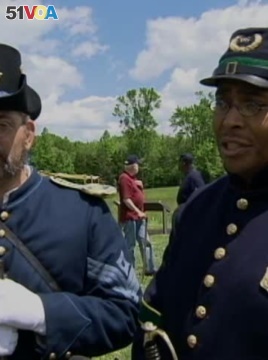July 03,2014
Their exploits were little known by most of the public in the decades after they fought, but towards the end of the 20th century, more attention began to be paid to the African-Americans who fought for the Union during the U.S. Civil War.

In 1862, African-Americans -- both free and escaped slaves -- were allowed to enlist in the Federal army. One hundred seventy-nine thousand served during the conflict, and many believe there service was a major turning point in the war. One of those black regiments was recently recognized for its Civil War contributions.
The participation of African-Americans in the U.S. Civil war was made popular to the world in the 1989 theatrical release of Glory, that depicted the story of the Massachusetts 54th U.S.C.T. or, United States Colored Troops. However, there were many other African-American regiments that fought in the war that divided a country and claimed 620,000 lives.
With the participation of Civil War re- enactors, the U.S. National Park service recognized the 23rd U.S.C.T., the first Black regiment to fight in direct combat with the Confederate Army of Northern Virginia.
“To come here today and to gather on this spot - really for the first time, yeah, first time ever public event -- public recognition on this place and its role in history. I just couldn’t imagine a more appropriate ending to this beautiful day than that,” said John Hennessy, a historian for the National Park Service.
The 23rd fought bravely and victoriously at The Battle of the Wilderness in Spotslyvania on May 15, 1864.
These men escaped from slavery and gathered in camps in and around Washington D.C. from 1863 to 1864. From there they were recruited into the Union Army of the Potomac and formed the 23rd.
They returned to the place of their enslavement to free those friends and families they were forced to leave behind.
“But the first significant battle that they were in was here. The second Ohio was going to reach out for help, the only help available is the fourth division of the Ninth Corps -- the fourth division are all US colored troops and then they will fire on Thomas Ross’s Calvary Brigade and drive them away,” said Steward Henderson, president of the 23rd U.S.C.T.
The re-enactors not only added a sense of authenticity to the event but they were also historians themselves.
It’s time-consuming and expensive. Only the most dedicated commit to this.
“The reason I put in time and money to be a re-enactor is that, I believe that adults and children in the United States - and elsewhere - should know about the history of black people,” said Malanna Carey, one of the re-enactors.
“I just never really knew our history as fully as I wanted to and ironically when I was in school I hated history and I think it was because I could not find myself in that history. They were able to answer questions like, ‘How did the Black regiments stand up to the expectations of the white troops?’” said Patricia Tyson, another.
“They had no idea what the former slaves could do; they had no idea if they would fight or run. So from their perspective I can kind of understand it but they had to earn their trust, in the U.S.C.T, the more they earn that trust, the more they took part in battles and all-that trust grew and it grew into legend. It grew into greater glory,” said Kevin Williams, also a re-enactor.
“It went from ‘oh no it’s the U.S.C.T’s, what’re they going to do’ to ‘oh good it’s the U.S.C.T’s, we know they stay and fight,’” explained re-enactor George Hart.
it wasn’t only the men. Women played a large role as well.
“There was no gentle Victorian status put for American African women, we worked, we labored we did whatever we had to do. They were part of the whole framework of the Union Army,” said Yulanda Burges, a re-enactor.
“We’re not one country, we are a lot of countries all together under one emblem - we’re Americans and it’s important that we remember that all of these men, regardless of where they came from, added something to our country,” said Larry Clowers, another.
The reasons for war will always be debated but the sacrifice and bravery of those who fought and died must always be acknowledged.